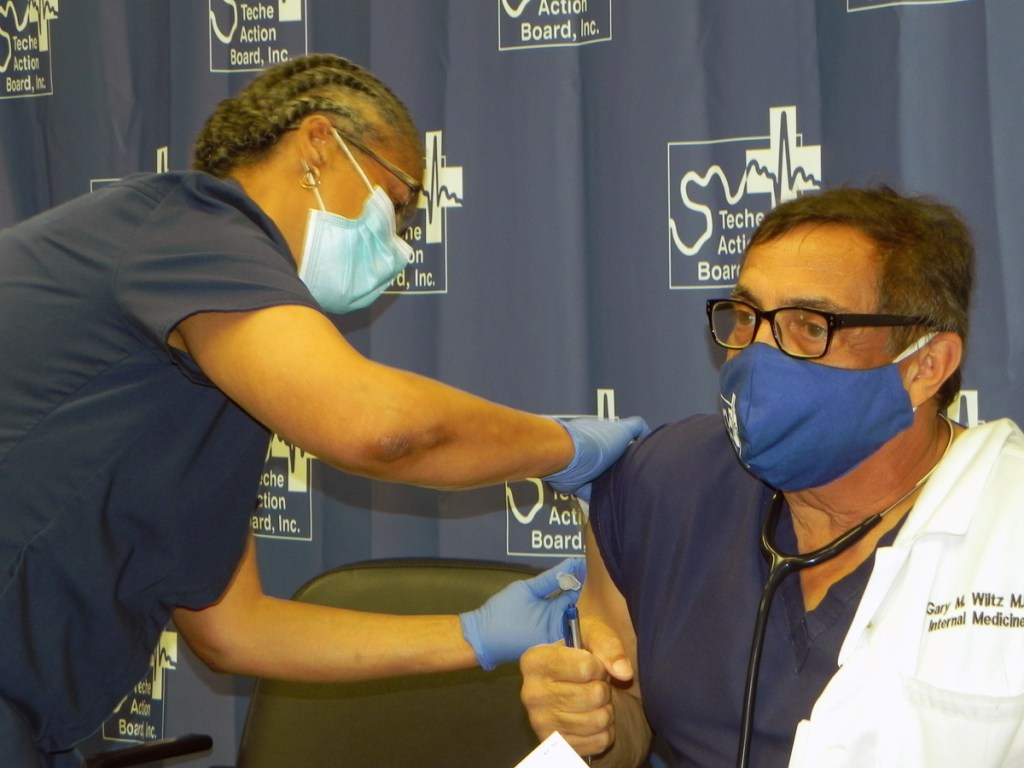Monoclonal antibody infusions fighting COVID-19 in St. Mary
Published 9:00 am Sunday, August 1, 2021

- Longtime Teche Action Clinic Nurse Cecille Gray inoculates Dr. Gary M Wiltz with the Moderna vaccine in January. As the CEO of all 15 clinics, Wiltz said he wanted to be the first to set an example.
FRANKLIN — Two area physicians are touting the success of monoclonal antibody infusions to fight COVID-19, and the Delta Variant strain.
Dr. Roland Degeyter, an internist working in Franklin, said he orders infusions for nearly 11 St. Mary Parish residents a week who have either tested positive or who qualify for the procedure.
A statement on the state Department of Health website notes that in December of 2020, the U.S. Food and Drug Administration approved the treatment, using drugs manufactured by the pharmaceutical companies Eli Lilly and Company and Regeneron Pharmaceuticals.
Dr. Gary M. Wiltz, another Franklin internist, said in order to qualify for the infusion, a patient has to have tested positive for COVID-19, be at least 12 years of age or older, weigh at least 88 pounds, or be within 10 days of the start of COVID-19 symptoms.
“Patients who are over 65, or who have comorbidities, also qualify for the infusion, as well as someone has been vaccinated, but is suffering from COVID-19 symptoms,” Wiltz said.
Examples of comorbidities include obesity, high blood pressure, fever, fatigue or unusual weakness.
Degeyter said the infusions or not for patients who are already hospitalized, or those who require oxygen therapy.
The state Department of Health is working with a group of hospitals that have the ability to administer the infusion therapy. This group includes Franklin Foundation, Iberia Medical Center, and Abbeville General Hospital.
Currently, St. Mary Parish residents undergo the two-hour infusion treatment as an outpatient at Franklin Foundation Hospital.
But Wiltz said there is a huge problem — not enough people know about the treatment.
“You know the old saying, ‘Help is on the Way’?” he said. “Well help has been here — it’s just not tapped.
“Shame on us if we don’t take more advantage of this, because it will prevent hospitalization.”
In a related matter, Degeyter said he has eyed a new procedure for patients hospitalized with COVID and has been in discussions with colleagues to implement that protocol, also at Franklin Foundation.
Months ago, the National Institute of Health began a trial using protein inhibitors to stop the progression of COVID-19 in patients who have inflammation.
Now the FDA has approved the use of the trial as a treatment involving special Interleukin-6 Inhibitors which can be administered to afflicted patients, provided that they are within the first three days of being admitted to the intensive care unit, or those who have rapidly increasing oxygen needs.
“Hopefully, we should make a decision in the coming week to begin with the Interleukin-6 treatment. I think we are all on board,” Degeyter said.
Wiltz said that with the first two weeks of July bringing a 200 percent increase in COVID-19 statewide, hospitals are full with patients.
“What’s it going to take for people to get vaccinated? I’m just at wit’s end. I believe it’s time we get rid of the gimmicks and start hearing from real people who have had COVID-19, and recovered,” Wiltz said. “The naysayers need to hear from a local person they may know, how it feels to struggle to breathe.”
Both Wiltz and Degeyter would like to encourage everyone to spread the word about the monoclonal antibody infusions; both physicians say the treatment has to be ordered through a personal physician.
Wiltz said the highest at risk groups are those who are not vaccinated.
“We have the tools to not only get COVID-19 under control, but also to save lives,” he said.
Degeyter is encouraging everyone to get vaccinated if they can.
“Regardless of who you are, mask up and wash your hands,” he said. “Some folks who are taking chemotherapy may not be able to get vaccinated. Please check with your physician.”
On Friday, St. Mary Office of Homeland Security and Emergency Preparedness Director David Naquin issued a press release, asking to add vaccination in the mix of washing your hands and observing social distance protocols, because “the chance of being a COVID patient is greatly reduced, or your infection may not require hospitalization.”
“How many of the new cases of persons requiring hospitalizations could have been avoided … maybe all of them, but certainly most of them. Keep this in mind when we go back to a full lockdown — it will be because of the unvaccinated in our communities,” Naquin said. “Yes, I said when, not if.”





